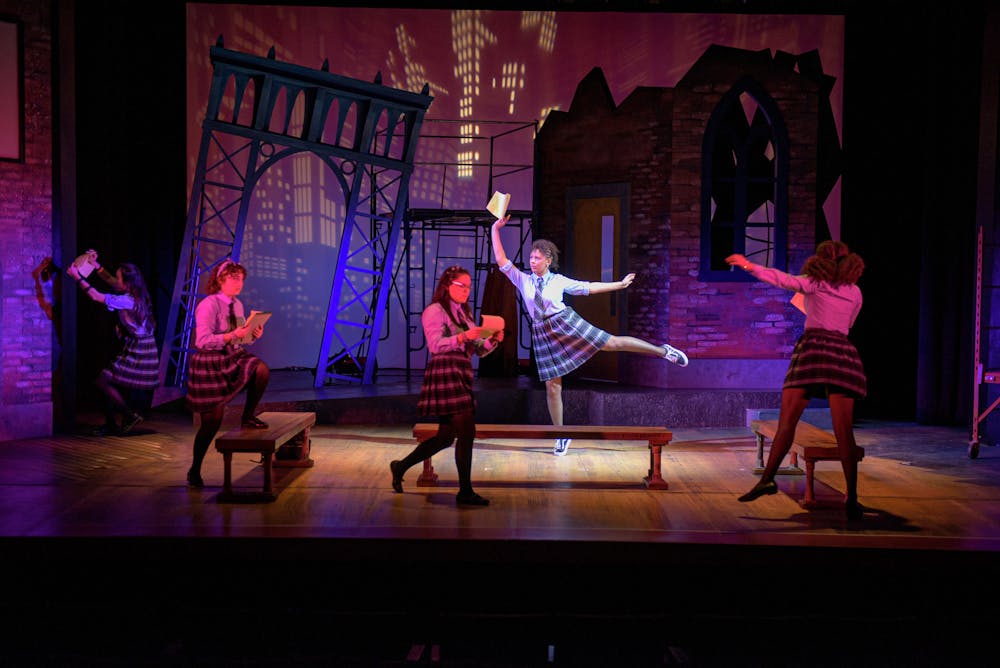Religious guilt, complex identities and the power of female friendship illuminated the Wright Theatre stage this past weekend in “The Virtuous Fall of the Girls from Our Lady of Sorrows.” The play was directed by Visiting Assistant Professor of Theatre Sheila Bandyopadhyay and ran from April 3—5.
Written by Gina Femiam in 2019, the play is set in an all-girls Brooklyn Catholic school, where a theatre production — a subversive sequel to Shakespeare’s 1604 play “Measure for Measure” — brings together a group of seemingly archetypal, but deeply revealing characters in dramatic and thought-provoking ways.
The girls live in an overtly religious and confining environment where swearing is frowned upon, sexual desire is cast as sinful and homosexuality is unthinkably taboo. Set in the aftermath of 9/11, Minnie (Virginia Frau ’27) and Dove (Sarah Caire Fong-Yan ’28) grapple with the tragic loss of their Father. Imogene (Payton Rice ’28) resists Sister Ignatius (Victoria Fischer Luksch)’s denouncement of her lesbian identity as unnatural; Jenny (Ella Juhl ’28) struggles to come to terms with her pansexuality as she falls in love with Immogen, her best friend; Maxx (Yoyo Zhang ’28) is an outspokenly bisexual rebel subverting all rules and conventions; Mathilda (Nonna Madoyan ’28), who believes in God, embarks on a tumultuous journey of self-discovery amidst newfound female camaraderie.
Mundane moments of school life are portrayed with humor, empathy and just the right amount of drama. Characters rise above their representative archetypes, reverberating deeper human struggles. I particularly loved the moments when the girls’ interiority seeps through the surface of normalcy, their humanity overtaking the oppressive religious doctrine. In one such moment, Jenny is shaken by how much substance and life there is inside an earthworm after having to cut one open in her Biology class. “They can love! They can double love!” She exclaims. This moment is both funny and poignant as it opens our eyes to the immensities within a miniscule organism — a metaphor for all that goes unnoticed, unappreciated and swept under the carpet in our grander, human lives.
In a conversation with The Campus, Juhl expressed the difficulty of bringing to life her character Jenny’s thoughtfulness amid her seemingly mindless bubbly energy. Jenny, unlike most other characters, does not get much time to directly showcase her inner life to the audience. But during the earthworm moment, we see her unadulterated enthusiasm for life and fascination with its myriad forms. Her sharpness, though coated in a seemingly simplistic ebullience, comes through unexpectedly and refreshingly.
“Another great learning point for me is to allow for the character to take over what I want, to focus on telling the story rather than on how I’m performing and being perceived by the audience. Each audience laughs at a different part of the monologue, so there is a build up of expectation in that sense, which is what I’m trying to relinquish so as to become a better vehicle of the story,” Juhl said.
Madoyan, who played Mathilda, began to fully embody her character, so much so that she started to unconsciously think and act from her character’s perspective. As the most contradictory and repressed character in the play, Mathilda is outspokenly Christian and feels her world shaken by the subversive attitudes of her peers. Taking the Bible as the absolute truth, she reveres Sister Ignatius, who represents a devout Christian ideal in the play.
“I didn’t initially find Mathilda to be a strong character because of how easily she’s influenced by other people. It’s as if she lacked a backbone,” Madoyan shared in an interview with The Campus. “But my understanding of her greatly changed throughout the process of embodying her. She has strong principles and always goes with what she thinks is right, but she’s also able to venture out of her comfort zone,” she added.
Madoyan revealed an imaginative understanding of Mathilda’s life and the extent of her emotional struggle beyond the scope of the script and directorial intent. Mathilda, who has a long history of self-harm, typically must wear long sleeves to communicate to the audience her discomfort with revealing certain parts of her body. Through Madoyan’s work in embodying this character, she learned the power of subtlety in storytelling.
“I don’t think it’s noticeable to the audience, but throughout the performance, I would always tug at my sleeve end whenever I get anxious or had to raise my hand. In this sense, it has become something overarching that is always on my mind. [I went] from not noticing it in the script to being constantly and fully aware of how I’m interacting with my sleeve,” Madoyan said.
The play ends with the enactment of Minnie (Frau)’s theatre production — set in hell — where each character exclaims “I am not a sin!” Mathilda’s notable absence, however, cracks this seemingly satisfactory ending where teenage girls embrace their humanity and vocally rebel against their conservative environment.
In the lecture following Friday night’s performance, Bandyopadhyay shared that Mathilda’s rejection of the play is more truthful to her character development, and that the play’s ending might very well signify the beginning of her individual journey. Madoyan also pointed out the original line in the script which reads: “Mathilda reads the play and walks away, and that’s okay.”
Indeed, it is this self-acceptance that underscores the play’s circuitous nature; each girl experiences personal rises and falls when their morality is challenged by the world around them. What Shakespeare writes in “Measure for Measure” echoes this very sentiment; “Some rise by sin, and some by virtue fall.”
Editor’s Note: Virginia Frau ’27 is an Arts & Culture Editor for The Campus.




